Faith and Politics

The unofficial results are in and it looks like former governor Mitt Romney won the Michigan primary with 41 percent of the vote. Many commentators believe that this win indicates a recovery of momentum for the Romney campaign.
There are now unconfirmed reports that building off the popularity of President Obama’s rendition of Al Green’s “Let’s Stay Together,” Mitt Romney has been working on a cover of Katy Perry’s "Hot n’ Cold" to sing for GOP primary voters.
Not to be outdone, Santorum, Gingrich, and Paul pull a few tricks from their sleeves too.
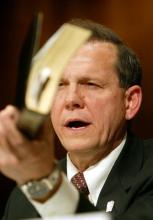
MOBILE, Ala. — You might think a candidate's ouster from the post he is seeking to regain would play a central role in a statewide election.
Yet Republican Roy Moore's forced exit, almost a decade ago, as Alabama's chief justice over a Ten Commandments monument seems only a murmur on the campaign trail.
Voters don't often ask about it, and the other two candidates in the March GOP primary hardly ever talk about it.
Moore plunged Alabama into a showdown in 2003 when he erected a 5,280-pound granite monument to the Ten Commandments in the Alabama judicial building in Montgomery. A federal judge declared the monument to be a violation of the separation of church and state and ordered Moore to remove it.
When Moore refused, a special panel of retired state judges voted unanimously to remove him from office for violating a higher-court order.
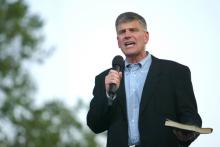
Evangelist Franklin Graham has apologized to President Obama for questioning his Christian faith and said religion has "nothing to do" with Graham's decision not to support Obama's re-election.
Graham's Tuesday apology came after a group of prominent black religious leaders criticized the evangelist for saying he did not know whether Obama is a Christian and suggesting that Islamic law considers him to be a Muslim.
Graham, president of the relief organization Samaritan's Purse and the son of famed evangelist Billy Graham, said he now accepts Obama's declarations that he is a Christian.
"I regret any comments I have ever made which may have cast any doubt on the personal faith of our president, Mr. Obama," he said in a statement.
GRAND RAPIDS, Mich. — Mitt Romney’s position on the Detroit auto bailout and health care plan have been blasted, but a pollster suggests one issue not often discussed on the campaign trail this year could end up costing him Tuesday's Michigan primary victory: his Mormon faith.
EPIC-MRA pollster Bernie Porn said the former Massachusetts governor’s faith hasn’t been as big of a topic as it was when he sought the nomination in 2008.
But Porn said on WGVU’s “West Michigan Week” that his polls show that 7 percent of the Republicans tallied said they wouldn’t vote for Romney because he is a Mormon – and the actual number might be higher.
With a race that could be decided by less than 5 percent, that could be a problem for Romney, he said.
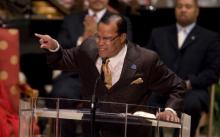
Jewish leaders on Monday denounced Nation of Islam leader Louis Farrakhan after he delivered a four-hour speech on Sunday that was laced with anti-Semitic statements about Jewish control of the media.
Speaking to thousands of supporters during the 82nd annual Saviors' Day celebration in Chicago, Farrakhan accused "Zionists" of trying to push America into war with Iran and dubbed Al-Jazeera, the Dubai-based news channel, as "Al Jew-zeera."
"I'm not anti-Semitic, I'm just telling the truth," Farrakhan asserted, alleging that Jews were responsible for a controversial 2008 cover of The New Yorker that depicted President Obama in Muslim garb.
Republican presidential hopeful Rick Santorum's claim that U.S. colleges drive young Christians out of church is facing scrutiny from Protestant and Catholic experts.
Santorum told talk show host Glenn Beck late last week that "62 percent of kids who go into college with a faith commitment leave without it." He also has called President Obama a "snob" for wanting more Americans to attend college.
"There is no statistical difference in the dropout rate among those who attended college and those that did not attend college," said Thom Rainer, president of the Southern Baptists' LifeWay Christian Resources research firm. "Going to college doesn't make you a religious dropout."
A 2007 LifeWay survey did find seven in 10 Protestants ages 18 to 30 who went to church regularly in high school said they quit attending by age 23.
The real causes: lack of "a robust faith," strongly committed parents and an essential church connection, Rainer said.
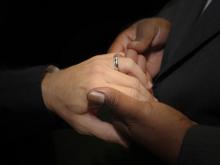
WILMINGTON, N.C. — As the only Southern state without a constitutional amendment barring same-sex marriage, North Carolina is the next battleground, with religious groups on both sides bracing for a high-stakes fight on May 8.
Against a recent string of gay-marriage victories in California, Washington state and Maryland, North Carolinians will be asked to vote on a constitutional amendment on May 8, the same day as the state Republican primary.
Same-sex marriage has been illegal in the Tar Heel State since 1996; Minnesota also has a marriage amendment planned for a vote in November.
"Marriage between one man and one woman is the only domestic legal union that shall be valid or recognized in this state," the proposed amendment reads.
A federal court has struck down a Washington state rule that requires pharmacists to dispense the morning-after pill even if it violates their religious beliefs.
Religious liberty advocates cheered the decision. They have decried the 2007 state regulation as a violation of pharmacists' First Amendment rights, which guarantee freedom of religion.
In an op-ed published today in the Charlotte Observer, Mike Daisley calls for Christians to "tone down the religious rhetoric."
Of course, the influence of religious belief on political discourse is nothing new. In the Bill of Rights, the very first phrase of the First Amendment contemplates the delicate balance of church and state. It has been challenging us ever since.
The issue of school prayer is but one example. Never mind that the Supreme Court on numerous occasions has ruled that only government-coerced prayer or state-sponsored prayer is unconstitutional. This fact has failed to dissuade numerous conservative groups from raising millions by suggesting that little Johnny could be taken away in handcuffs if the godless secularists who "outlawed prayer in schools" aren't stopped.
If you’ve watched 6 minutes of news in the last few weeks, you know what this is all about: Christian leaders hurling attacks and using faith as a weapon to score political points. From presidential candidates to public leaders, rhetoric in recent weeks as gone from ‘heightened’ to ‘dangerous.’
To counteract this incendiary environment, prominent evangelical, mainline, and Catholic pastors, theologians and denominational heads have joined together to take a stand. The open letter, which currently has over a hundred signers, supports the President in light of the recent attacks by Franklin Graham (see clip below), but the letter also speaks to the larger issue at hand, specifically that, “No politician or government will ever reflect God’s will perfectly, but we prayerfully call on political leaders and members of the media to return to the issues Jesus and the prophets were most concerned about and to stop using faith as a weapon to advance partisan politics and self-interest.”

Religion And Politics Don't Mix, Major Religious Groups Tell Presidential Candidates; 25 Percent Of Super PAC Money Coming From Just 5 Rich Donors; POLL: Men, Evangelicals Boost Santorum; Southern Baptist Leaders OK 'Great Commission'; Obama Budget: Grow Prisons and Keep Gitmo; The Failure Of Austerity Politics (OPINION); Atheist Alain de Botton Insists Society Needs Guidance From Religion; Access To Good, Healthy Food Should Be A Basic Human Right; Protesters To GOP Candidates: Don't DREAM Halfway.

My pastor and I have a friendly tiff going on. He says that Jesus was strictly a-political; therefore Christians should abstain from politics completely. I say that Jesus challenged violent, poverty-inducing, socio-political structures throughout his life and ministry; therefore Christians have a duty to advocate for peace and to speak out for the poor and the oppressed. Both of us are hardheaded, and neither of us cedes much in our debates, but we always walk away as friends, because at the end of the day there’s a key component to the discussion that we both agree on: The Bible is not a public policy manual!
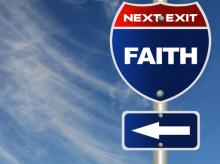
Graham's thinking is dangerous. What he has failed to realize is that he, like many, is guilty of having a biased, preconceived "kind" of Christian and “brand” of Christianity. Often, these preconceptions fall along partisan lines. This was seen clearly in his willingness to affirm the Christian faith of candidates that share his political viewpoint (Gingrich, Santorum), but open the door for speculation on those (Obama, Romney) who do not. We can never forget that Jesus never demanded a “one size fits all” kind of faith. We must always allow room for disagreement and live with the tension of multiple opinions.

Does theology matter when it comes to evaluating political leaders? How does this whole faith and politics thing work?
Both Barack Obama and Rick Santorum have strong records on supporting legislation and funding policies that fight global poverty and pandemic diseases. Both men have talked about how their concern for the poor is motivated by their faith.
I feel comfortable with that and I think most people do. It is an example of political figures expressing their personal motivation behind widely held values that aren’t exclusive to a particular religious tradition.
There are some religious beliefs, such as a particular stance on infant baptism, understanding of the Trinity, or belief in what occurs when Christians observe the Lord’s Supper that are significant theological claims. But they aren’t good or appropriate benchmarks by which to evaluate political candidates.
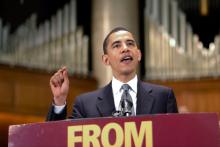
Editor's Note: Following here below is the text of Barack Obama's keynote address at the Sojourners/Call to Renewal "Building a Covenant for a New America" conference in Washington, D.C., as he delivered it on June 26, 2006.
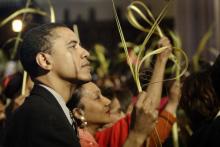
Editor’s Note: At 3:30 p.m. on Saturday, March 27, 2004, when I was the religion reporter for the Chicago Sun-Times, I met then-State Sen. Barack Obama at Café Baci, a small coffee shop at 330 S. Michigan Avenue in Chicago, for an interview about his faith. Our conversation took place a few days after he’d clinched the Democratic nomination for the U.S. Senate seat that he eventually won, and four months before he’d be formally introduced to the rest of the nation during his famous keynote speech at the 2004 Democratic National Conventio.
We spoke for more than an hour. He came alone. He answered everything I asked without notes or hesitation. The profile of Obama that grew from the interview at Cafe Baci became the first in a series in the Sun-Times called “The God Factor,” which would eventually became my first book, The God Factor: Inside the Spiritual Lives of Public People, in which Obama and 31 other high-profile “culture shapers” — including Bono of U2, Nobel Laureate Elie Wiesel, the author Anne Rice and President George W. Bush's speechwriter Michael Gerson — are profiled.
Because of the seemingly evergreen interest in President Obama’s faith and spiritual predilections, and because that 2004 interview remains the longest and most in-depth he’s granted publicly about his faith, I thought it might be helpful to share the transcript of our conversation — uncut and in its entirety — here on God’s Politics.
~ Cathleen Falsani

But what about when the government itself asks us to lie, or at least to not fully disclose the truth? Consider the “Don’t Ask, Don’t Tell” policy, which the military had in place for many years. What if a soldier argued that not knowing the person serving next to them was actually gay caused them irreparable psychological or emotional harm? Not that I think such a case holds any water, but I’m using this to make a point; once you allow the government to have legal authority over personal speech, it’s a difficult box to close back up once it’s open.
I think it’s a particularly compelling question given the debates about placing the Ten Commandments in public buildings. Yes, there are many parallels between those biblical laws and the laws enforced by the government. However, they are not the same in all cases. And the distinction is important not only with regard to the separation of the powers of church and state, but also in maintaining the sovereignty of the individual in the face of a powerful government.

In fact, President Obama, himself, had a puzzled look as he said, “Hello Eugene.” So, I had to introduce myself to him and explained to him that I was a pastor here in Seattle and involved with some other work. We chit-chatted briefly about stuff but there is something I very specifically remember and I don’t know if I’ll ever forget this portion of our conversation.
I shared with President Obama that I occasionally but regularly prayed for him and this is how he responded:
“Thank you, Eugene. I really appreciate that. Can you also please pray for my wife and children? Pray for their protection.”
His demeanor changed. Perhaps, this is just me. Perhaps, I’m reading and analyzing too much into all the non-verbal cues but then again, I’m a pastor and after 21 years of doing ministry, you develop a “pastoral sense” and I genuinely sensed his gratitude for prayer and his request for prayer for his family.

I was intrigued by a recent comment from a major political contributor when he suggested using Bayer aspirin was a viable birth control method for women. Mega-contributor Foster Friess was being interviewed by MSNBC’s Andrea Mitchell when he referred to bygone days when “the gals put it between their knees, and it wasn’t that costly.”
He later claimed the remark was just a joke, but not before I’d spent a half hour trying it out. I wouldn’t have wasted my time seeing if it was possible which, according to my unscientific test, it’s not. Of course, it could have been the slacks I was wearing, which sometimes gather at the knees, or the angle in which I was sitting. But the darn thing just kept falling out.

On Ash Wednesday, Catholics and many others will walk around with ashen crosses (or, by the end of the day, what look like indeterminate smudges) on our foreheads. Those ashes are strong symbols of core principles of the Catholic faith — symbols of repentance, identity, reconciliation, and renewal of baptism in the faith.
As a voting rights lawyer who is about as passionate about my work as I am about my faith, I can’t help but see parallels between the moral guidance I am given by my faith, and the policy choices that confront us in the secular world. These principles are reflected in the way we worship – and also in the actions we take in the secular world. This has led me and others to the conclusion that the 4 million Americans who lost their voting rights while incarcerated, and now live in our communities, deserve the chance to vote again upon release. It is both the just and the moral thing to do.
As we approach Ash Wednesday during this Holy Season, I encourage all Christians, guided by their core beliefs, to consider this idea.